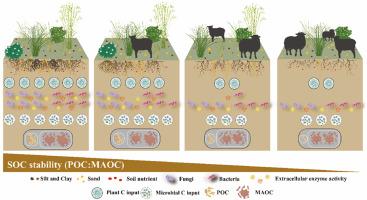Grazing disturbance reduces soil organic carbon sequestration and stability in desert steppe
IF 8.4
2区 环境科学与生态学
Q1 ENVIRONMENTAL SCIENCES
引用次数: 0
Abstract
While grazing effects on soil organic carbon (SOC) stocks are documented, how stocking rates repartition carbon between labile and stable fractions in desert steppes remains unknown. Previous studies have focused predominantly on individual carbon pool stocks rather than on inter-component equilibrium. Here, we evaluated the results of a twenty-year controlled grazing experiment, systematically analyzing how prolonged stocking pressure alters the proportional stability of particulate organic carbon (POC) and mineral-associated organic carbon (MAOC) by disrupting the formation of POC and MAOC from plant and microbial precursors. We found that, despite maintaining stable proportions relative to total SOC, POC and MAOC sub-pools exhibited parallel declines under overgrazing. This demonstrates that SOC destabilization arises from systemic changes to carbon repartitioning rather than from isolated pool depletion. Grazing-induced shifts in plant community composition and soil structural features impaired microbial functionality and enzymatic processes, limiting the transformation of organic substrates into more stable forms of soil carbon. These findings advance desert steppe management by highlighting the importance of prioritizing component ratio stability over conventional stock-based metrics and offers actionable strategies to balance carbon sequestration.

放牧干扰降低荒漠草原土壤有机碳固存和稳定性
虽然放牧对土壤有机碳储量的影响已有文献记载,但载畜率如何在荒漠草原的不稳定组分和稳定组分之间重新分配碳仍是未知的。以往的研究主要集中于单个碳库储量,而不是组分间的平衡。通过20年的对照放牧试验,系统分析了长期放养压力如何通过破坏植物和微生物前体POC和MAOC的形成来改变颗粒有机碳(POC)和矿物相关有机碳(MAOC)的比例稳定性。我们发现,尽管POC和MAOC子库相对于总SOC的比例保持稳定,但在过度放牧的情况下,POC和MAOC子库呈平行下降趋势。这表明有机碳不稳定是由碳再分配的系统性变化引起的,而不是由孤立的碳池枯竭引起的。放牧引起的植物群落组成和土壤结构特征的变化损害了微生物功能和酶促过程,限制了有机基质向更稳定的土壤碳形式的转化。这些发现通过强调优先考虑组分比例稳定性而不是传统的基于库存的指标的重要性,促进了沙漠草原管理,并提供了平衡碳固存的可行策略。
本文章由计算机程序翻译,如有差异,请以英文原文为准。
求助全文
约1分钟内获得全文
求助全文
来源期刊

Journal of Environmental Management
环境科学-环境科学
CiteScore
13.70
自引率
5.70%
发文量
2477
审稿时长
84 days
期刊介绍:
The Journal of Environmental Management is a journal for the publication of peer reviewed, original research for all aspects of management and the managed use of the environment, both natural and man-made.Critical review articles are also welcome; submission of these is strongly encouraged.
 求助内容:
求助内容: 应助结果提醒方式:
应助结果提醒方式:


